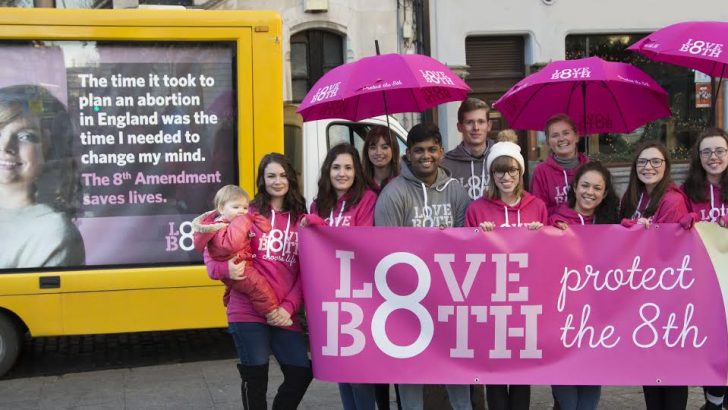The View
There are a lot of questions about the forthcoming abortion referendum and the country’s response to it.
Perhaps the first question is: does everyone know what the Eighth Amendment actually says? An important question, when the people are about to vote about whether it stays or it goes.
It’s not just about the right to life of the unborn child, rather it recognises the complexity in the situations which may evolve in the course of a human life. It says: “The State acknowledges the right to life of the unborn and, with due regard to the equal right to life of the mother, guarantees in its laws to respect, and, as far as practicable, by its laws to defend and vindicate that right.”
So, the first question for the people of Ireland must be whether the country would be better served by a constitution which recognises and affirms the right to life of both mother and child, or whether the child’s right to life is to be capable of being extinguished as a consequence of a positive response to the repeal the Eighth campaign. Therein lies the real question. The place where an unborn child should be safest is in its mother’s womb. Will the people of Ireland decide that there is to be no safe place for an unborn child?
That is the primary question for the people of Ireland. No one knows at this stage what any law permitting abortion might say.
In Britain, currently a child can be aborted up to 24 weeks of gestation, or right up to birth if the mother’s life is at risk or the baby has a serious disability. Babies are routinely aborted because they have cleft palates or because they have Down syndrome or even because they are little girls or boys and the mother does not want a child of that sex.
Normally, sex-selective abortions are carried out on baby girls, because there are societies in which boys, for a variety of cultural reasons are seen as preferable to girls. Such abortions should not happen, but they do.
Now there is a campaign to extend the right to abortion right up to birth.
Abortions happen there, and would happen here for a myriad of reasons: because that child is surplus to the requirements of that particular mother, because it is not the ‘right’ kind of child, or it is not convenient, now, to carry the child safely through pregnancy, or perhaps because the baby has a condition which means that the mother should be able to decide to terminate its life.
To describe it thus is not to minimise the distress of any woman who is unable to bear the reality of pregnancy but to state the facts baldly.
Does Ireland wish to be a country which provides care and compassion for both mother and children in these circumstances, or one which says the life of the child in the womb has no value, and can be terminated?
Whatever happened in the past, and whatever criticisms we may rightly make of the culture of the past, we have to recognise that killing babies before they are born may seem to some to be an easier option than caring for them until they can care for themselves, but it isn’t.
At least for the little child in the womb it is a painful and terrible end to a very short life no matter how that is achieved.
And if a baby is born living after an abortion, as happens, will he or she be left to die, uncuddled, unloved, unwanted.
The second question might be if Ireland as a country decides it wants to abandon the Eighth Amendment, who is going to carry out the consequential abortions?
Doctors, nurses, pharmacists and GPs do not become medical professionals to kill. They become medical professionals to care. The fundamental professional obligation is ‘to do no harm.’
Will Ireland’s healthcare professionals be required to carry out abortions, or to manage, delegate or supervise them?
In Britain, when the Abortion Act was passed in 1967 David Steel, the author of the legislation, said in Parliament that “it gives nurses and hospital employees the right to opt out”.
It was understood that there would be a right of conscientious objection. So it was at first – then gradually, all that changed. Now in Britain medical practitioners are only allowed to refuse to engage personally with the removal of the baby from the womb, the actual killing of the unborn child. They must do everything else.
Medical practice
For the nurse who choses to go into obstetrics and gynecology because it was an area of medical practice which is life-affirming, and wonderful, there is now an obligation to participate indirectly in the killing of the baby in the womb.
People have lost their jobs and been unable to apply for jobs because their conscience tells them that it is wrong to kill the child in the womb.
We know that in England and Wales doctors and nurses leave the country to practice elsewhere, rather than be forced to engage with that which they believe to be wrong.
We know too that there are those whose engagement with the process of abortion is not voluntary, but a matter of holding onto a job.
Last month I introduced into Parliament a Conscientious Objection (Medical Activities) Bill aimed at providing protection for those who are unable for reasons of conscience to participate in abortion, in the destruction of embryos under the Human Fertilisation and Embryology Act and the withdrawal of treatment at the end of life. Welcomed by some, it was roundly rejected by others who said that they fear that the NHS will not be able to provide the services required. The Bill is now making its way through Parliament.
The dilemma seems to come down to this – those who would provide abortions may provide some protection for conscience, yet force people to do things which they hold to be wrong, such as telling somebody else to take part in an abortion. It cannot be right to make people do things they believe to be wrong.
If I, in conscience, cannot abort a baby then I will be unable to tell someone else to do it. If I do delegate the carrying out of the act to someone else, I do not escape moral responsibility, and I will know that.
Doctors and nurses are not functionaries or robots who will carry out any form of treatment directed. Rather, at each moment of the day they are making moral judgments about the care and treatment of patients.
No civilised state should require medical practitioners to act against their conscience in matters of life and death. In these circumstances it is vitally important that every person exercises their right to vote in the coming referendum.
For me it is a matter of conscience too. It would be wrong to stand by and not vote, not attempt to influence the national debate.
So, as the referendum campaign gets underway, there is surely an obligation on everyone to talk about what it actually means – the termination of the life of a little baby, the killing of a child in the womb, and to do everything they can to protect Ireland’s future little boys and girls, and to allow them to live the lives and make the contribution for which God formed them in the womb.
This is the most vital question Ireland has faced or will face. Will it protect all its children?


 Nuala O’Loan
Nuala O’Loan
